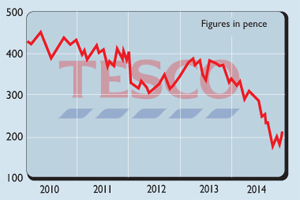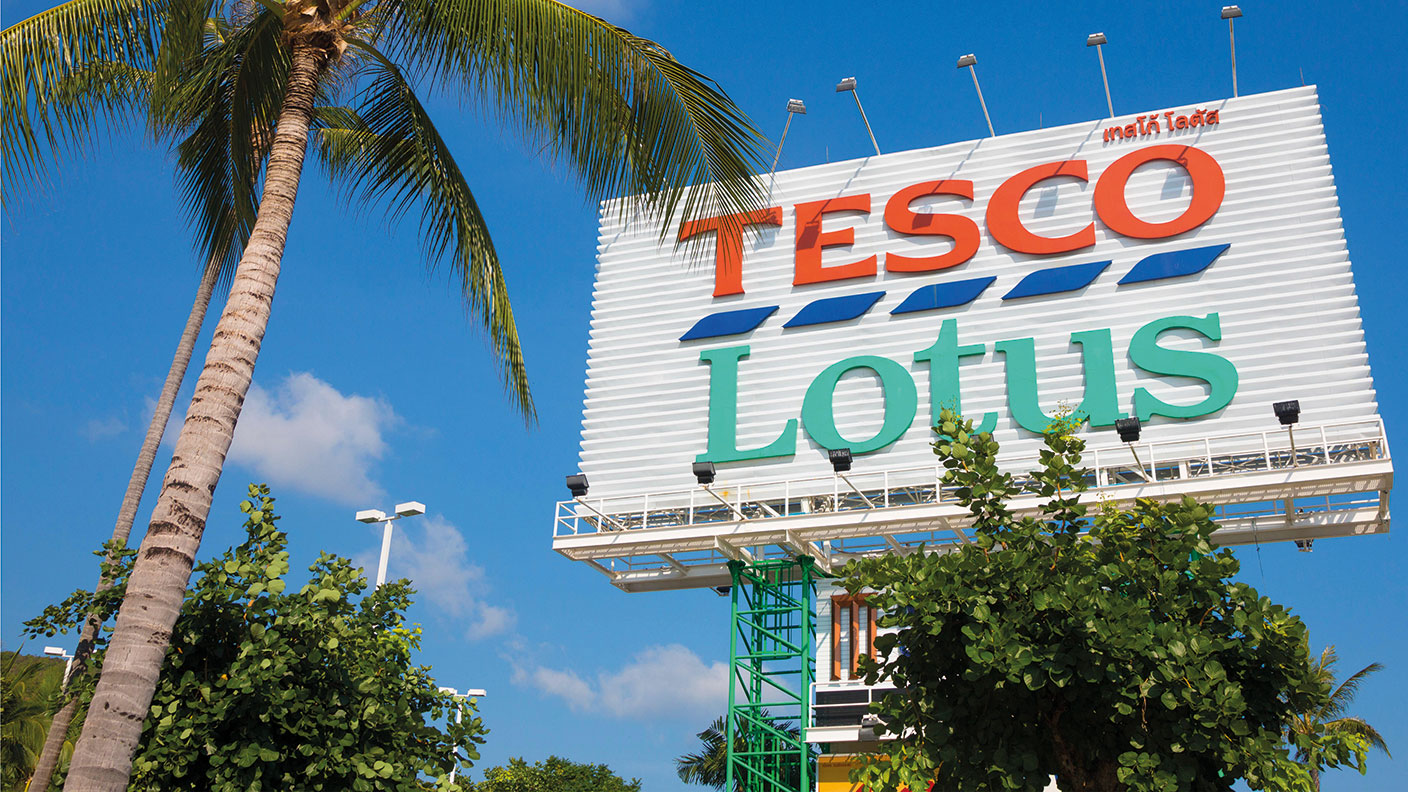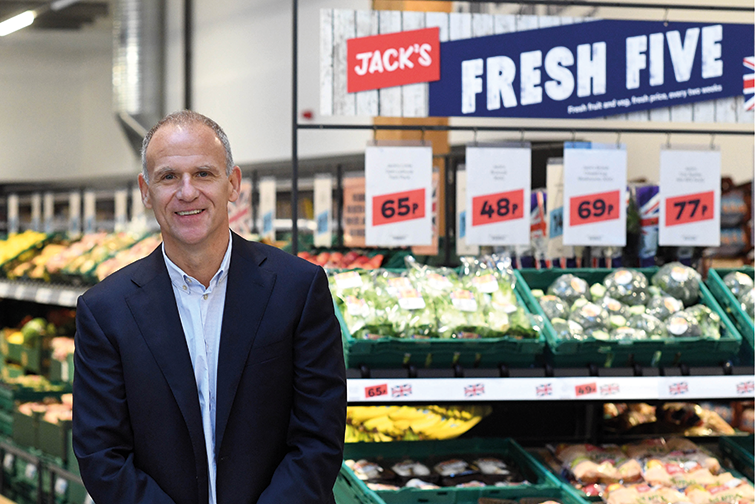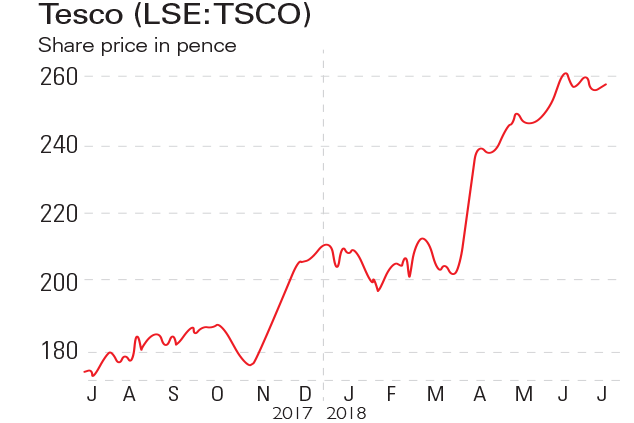Shares in focus: The Tesco turnaround
Supermarket giant Tesco is restructuring and its shares are on the up. Should you buy in, asks Phil Oakley.
Get the latest financial news, insights and expert analysis from our award-winning MoneyWeek team, to help you understand what really matters when it comes to your finances.
You are now subscribed
Your newsletter sign-up was successful
Want to add more newsletters?

Twice daily
MoneyWeek
Get the latest financial news, insights and expert analysis from our award-winning MoneyWeek team, to help you understand what really matters when it comes to your finances.

Four times a week
Look After My Bills
Sign up to our free money-saving newsletter, filled with the latest news and expert advice to help you find the best tips and deals for managing your bills. Start saving today!
The retailer is restructuring and its shares are on the up. Should you buy in? asks Phil Oakley.
Tesco's bucket-load of problems was plastered all over the financial press for much of 2014. The supermarket giant will be hoping that 2015 is a better year, and that it can start the process of rebuilding its profits and restoring its reputation with investors.
Last week, Dave Lewis, the company's new chief executive, announced a strategy to put Tesco back on track. After he discussed his plans, the share price jumped by 15% although it's by no means certain whether this was because investors liked what they heard, or were just mightily relieved that things hadn't got any worse.
MoneyWeek
Subscribe to MoneyWeek today and get your first six magazine issues absolutely FREE

Sign up to Money Morning
Don't miss the latest investment and personal finances news, market analysis, plus money-saving tips with our free twice-daily newsletter
Don't miss the latest investment and personal finances news, market analysis, plus money-saving tips with our free twice-daily newsletter
So here's the question for anyone eyeing up the shares: is Tesco really ready to take on its competitors again, or will last week's exuberance prove to be short lived?
The outlook
For much of the past 20 years, Tesco has been lauded as a retail champion and seen as a great success story. Throughout the 1990s and the early 2000s, this reputation was probably justified.
But for much of the last decade, Tesco has not been a good business from an investor's standpoint. Yet its share price and legion of fans kept on growing.
Why do I say this? Ultimately, companies grow and make profits by using the funds raised from their lenders and shareholders to make good investments. Companies that achieve this have lots of desirable characteristics.
Speaking from a financial perspective, I'd single out three specific ones. Profits should be growing. There should be a high return on capital employed (ROCE). And the company should be turning those profits into cash.
Tesco had the first one of these, but it fell down badly on the other two. So when its profits stopped growing, it shouldn't have come as a great surprise that its share price tanked.
So will Lewis's strategy make Tesco great again? It would be a great achievement if it could. But I don't think that it can. Here's why.
A lot of what Lewis is trying to do looks sensible. Closing loss-making stores and stopping the opening of big superstores is a good decision. So is the selling of peripheral businesses, such as the Blinkbox internet television service, and the possible sale of others.
The goal here is for Tesco to save £250m and use that money to cut prices so that it can be more competitive.
However, I can't help thinking that some of its proposed cost-cutting could backfire. For a start, shutting the final-salary pension scheme to all employees is unlikely to have a good effect on staff morale.
Meanwhile, cutting investment is something that Tesco should have done years ago. Over the last decade it has ploughed nearly £35bn into the business (excluding acquisitions) and doesn't really have that much to show for it.
But it can cut too far. The proposed capital expenditure of £1bn next year is below the £1.3bn annual depreciation charge (this is an estimate of the amount of money needed to maintain a company's asset base). That could mean that Tesco's supermarkets start to look more scruffy than some already are. This won't help maintain customer loyalty, or win new customers.
That's a potential problem. Cost cuts can only take the company so far. Tesco needs meaningful sales growth if its profits are to start expanding again. It looks as though the company did a decent job over Christmas, as sales only fell slightly.
But I think that Tesco and Sainsbury's, Asda and Morrisons, for that matter will all find it really hard to grow their sales. Tesco looks well placed in areas such as online and convenience stores. But I think it will struggle to get more money through the tills of its supermarkets.
That's because the UK's grocery market is barely growing. Instead, it is fragmenting into different segments. The rapid growth of discount retailers, such as Aldi and Lidl, is hurting the big four supermarkets, while Waitrose is growing successfully at the top end.
Tesco looks like it's starting a price war by cutting the prices of 380 branded items by an average of 25%. This might put pressure on Aldi and Lidl, whose low prices tend to come from unbranded goods. But Tesco's bigger rivals, such as Sainsbury's and Asda, will match these cuts and might be in a stronger financial position than Tesco to weather the storm.
In a sector that is already seeing falling prices, this move by Tesco will just squeeze prices even harder. To grow sales when prices are falling, you have to believe that Tesco will win back a lot of customers and that those who have stayed loyal will put more goods in their trolleys. This looks like a major gamble.
Although falling petrol prices have given household finances a bit of a boost recently, they are hardly healthy after years of stagnant wages and high levels of debt. I just can't see households spending more money on their weekly groceries. And if they don't, then profits at Tesco are unlikely to grow and could even fall further.
Last, but not least, there's the important issue of the valuation of Tesco's shares. Tesco as a business has been in some distress but its share price of 204p suggests that its valuation is not. At 15 times expected February 2016 earnings per share (EPS), they just don't look that cheap. The earnings yield of just 5.8% (EBIT/EV), based on February 2015 trading profits of £1.4bn, is similarly unattractive.
Tesco might prove me wrong and deliver a fantastic turnaround in its fortunes. However, it looks as if a decent chunk of improvement is already priced into its shares.
I'd be interested in buying at around a pound lower than the current price, but the rewards on offer from here compared to what are still very high risks mean I'd stay well clear of the shares.
Verdict: avoid
Tesco (LSE: TSCO)

What the analysts say
Get the latest financial news, insights and expert analysis from our award-winning MoneyWeek team, to help you understand what really matters when it comes to your finances.
Phil spent 13 years as an investment analyst for both stockbroking and fund management companies.
-
 Should you buy an active ETF?
Should you buy an active ETF?ETFs are often mischaracterised as passive products, but they can be a convenient way to add active management to your portfolio
-
 Power up your pension before 5 April – easy ways to save before the tax year end
Power up your pension before 5 April – easy ways to save before the tax year endWith the end of the tax year looming, pension savers currently have a window to review and maximise what’s going into their retirement funds – we look at how
-
 How to profit from rising food prices: which stocks should you invest in?
How to profit from rising food prices: which stocks should you invest in?Tips Food prices are rising – we look at the stocks to avoid and the one to invest in this sector.
-
 Tesco looks well-placed to ride out the cost of living crisis – investors take note
Tesco looks well-placed to ride out the cost of living crisis – investors take noteAnalysis Surging inflation is bad news for retailers. But supermarket giant Tesco looks better placed to cope than most, says Rupert Hargreaves.
-
 Tesco sells its retail subsidiary in Thailand and Malaysia for £8bn
Tesco sells its retail subsidiary in Thailand and Malaysia for £8bnNews Tesco has agreed to sell its southeast Asian operations to Thai conglomerate Charoen Pokphand for £8.2bn in cash.
-
 Tesco should keep its Asian assets
Tesco should keep its Asian assetsOpinion The £7bn that Tesco could get for its Tesco Lotus business in Asia looks enticing. But holding on to it would be smarter, says Matthew Lynn.
-
 Tesco wields the axe
Tesco wields the axeFeatures Britain’s biggest supermarket is cutting back on staff and fresh food. Will the move prove counterproductive? Matthew Partridge reports.
-
 If you'd invested in: Tesco and Associated British Foods
If you'd invested in: Tesco and Associated British FoodsFeatures Tesco has seen its market value rise almost 50% in a year, while AB Foods has seen shares slide despite a rise in profits.
-
 What's behind Tesco’s alliance with Carrefour?
What's behind Tesco’s alliance with Carrefour?Features Tesco is clubbing together with French rival Carrefour to bulk buy own-label goods in an effort to cut costs. Will it succeed? Ben Judge reports.
-
 Lessons from Tesco’s turnaround
Lessons from Tesco’s turnaroundOpinion Retailers have it tough, but Tesco has shown that it’s still possible to thrive, says Matthew Lynn.